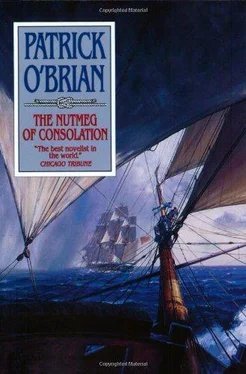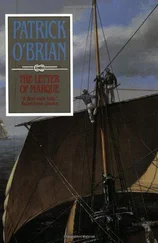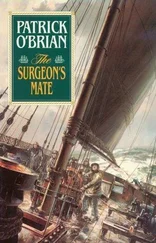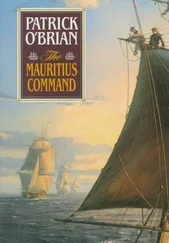Patrick O'Brian - The Nutmeg of Consolation
Здесь есть возможность читать онлайн «Patrick O'Brian - The Nutmeg of Consolation» весь текст электронной книги совершенно бесплатно (целиком полную версию без сокращений). В некоторых случаях можно слушать аудио, скачать через торрент в формате fb2 и присутствует краткое содержание. Жанр: Книги. Описание произведения, (предисловие) а так же отзывы посетителей доступны на портале библиотеки ЛибКат.
- Название:The Nutmeg of Consolation
- Автор:
- Жанр:
- Год:неизвестен
- ISBN:нет данных
- Рейтинг книги:3 / 5. Голосов: 1
-
Избранное:Добавить в избранное
- Отзывы:
-
Ваша оценка:
- 60
- 1
- 2
- 3
- 4
- 5
The Nutmeg of Consolation: краткое содержание, описание и аннотация
Предлагаем к чтению аннотацию, описание, краткое содержание или предисловие (зависит от того, что написал сам автор книги «The Nutmeg of Consolation»). Если вы не нашли необходимую информацию о книге — напишите в комментариях, мы постараемся отыскать её.
The Nutmeg of Consolation — читать онлайн бесплатно полную книгу (весь текст) целиком
Ниже представлен текст книги, разбитый по страницам. Система сохранения места последней прочитанной страницы, позволяет с удобством читать онлайн бесплатно книгу «The Nutmeg of Consolation», без необходимости каждый раз заново искать на чём Вы остановились. Поставьте закладку, и сможете в любой момент перейти на страницу, на которой закончили чтение.
Интервал:
Закладка:
This would be in the very near future, for now the real boats had shoved off, and Killick and his mates were on their way with trays of glasses, bottles, fritoons and what other delicacies the Surprise could afford.
'Killick!' they called, not very loud; but Killick affected not to hear, and pursing his lips he posed the trays on the gleaming capstan head, everything arranged just so, the pieces of baconrind neatly crossed, nothing to be touched until the feast began.
'Stand by,' cried the bosun, and poised his call. 'Side-men away,' called West, the officer of the watch, as the first boat hooked on and the guests were piped aboard.
The first was Goffin, a tall burly black-haired man with a red face, a post-captain who had been cashiered (though he still wore the naval uniform, with trifling changes). He saluted the quarterdeck; all the officers returned the salute: he said 'How do you do, Aubrey?' without a smile and turned straight to Killick and the capstan; his nephew followed him, somewhat more gracious; then came the people from the Nutmeg, with the two surviving French officers, and finally Adams, accompanied by Reade and Oakes, for whom Jack felt a particular responsibility and who were to remain in the frigate; though they, having dined at noon, could not reasonably hope to dine again.
When all the officers had taken their whet, which was limited to gin, Hollands and Plymouth, and madeira, Jack led them below; as they trooped in, crowding the great cabin, Goffin called out 'By God, Aubrey, you do yourself proud,' and he moved towards the head of the table with its splendid array.
'Here, sir, if you please, opposite your young gentleman,' said white-gloved Killick, showing him a place at the other end, next to Pullings.
He swelled, his face went a darker red, and he sat down. It was impossible to fault the arrangement: by immemorial convention the captured French officers sat on Jack's right and left and the King's officers took place of those who were not or who were no longer King's officers. If this had been a small informal gathering and if Goffin had been a friend Jack might have ordered things differently: but then again he might not - when he had been struck off the list himself, when he had been in Goffin's uncomfortable position, well-meaning but thick-headed friends had sometimes given him the precedence due to his former rank; and he could feel the misery yet. Goffin however saw the matter in another light; he felt that his condemnation for the trifling offence of false muster was so merely technical (he had entered the name of a friend's son on his ship's books to win the wholly absent boy some years of service-time when he should in fact go to sea; a common practice, but illegal; and his clerk, repeatedly kicked and cuffed, betrayed him) that he deserved better treatment. He sat for some time, trying to work out some remark that, though offensive, should not be too gross.
He had a perfectly good opportunity with the soup, which smelt so like a glue-factory that the two Frenchmen put down their spoons before exchanging a haggard look and submitting to the horrors of war, while Pullings, for the honour of the ship, called to Stephen 'Very good soup, Doctor,' and Jack said quietly to his neighbour 'I am so sorry, Jean-Pierre: it was a desperate measure. Please tell your friend not to finish it.' But Goffin missed his chance; soups were all one to him; he ate it mechanically and passed his plate for more; and only when the plate was empty did he say to his nephew on the other side of the table, an elderly young gentleman who had failed to pass for lieutenant, 'Was you ever at a Lord Mayor's banquet, Art?'
'No, sir.'
'Or any of the City halls, Grocers', Fishmongers' and the like? This is the sort of show you see among the commercial gents.'
The shaft missed its mark, because Jack was laughing in his deeply amused, full-throated way at one of his own jokes, but this and various other jets of malignance were perceived by those at the lower end of the table and it did not take long for Jack to become aware of their uneasiness. He guessed its source when he saw that dark face down there at Pullings' right and he was certain of it a moment later.
In a pause Fielding had just said 'Speaking of bears, sir, did I ever tell you that my father was a midshipman in the Racehorse under Lord Mulgrave, or Captain Phipps as he was then, in his voyage towards the North Pole? He was not exactly shipmates with Nelson, who was in the Carcass, but they saw a great deal of one another ashore, and they got along together famously. Nelson...'
'You must not talk about Nelson with two French officers in company,' cried Horse-Flesh. 'It ain't civil.'
'Oh, never mind us, sir,' replied Jean-Pierre with a laugh.
'Our withers are unwrung. We have Duguay-Trouin, to name but one.'
'Duguay-Trouin? I never heard of him.'
'Then you have a treat in store,' said Jean-Pierre. 'A glass of wine with you, sir.'
'A glass of wine all round,' said Jack. 'Bumpers now, gentlemen, and no heel-taps. To Duguay-Trouin, and may we never meet his like.'
After this, at Stephen's suggestion, they drank to Jean Bart too. Killick and his mates ran in and out; the heap of empty bottles rose high in the steerage; an array of far more creditable dishes covered the table and Jack said 'Pray, Mr Fielding, go on with your account. It was not Nelson's famous attempt at a bear's skin, I collect?'
'Oh no, sir: in fact it is not much of a story at all, except when my father tells it, but I will just give the bare bones to show there is another side to the creature.'
'Bare bones is very good,' said Welby, chuckling into his wineglass.
'The ships were coming back from about eighty-one north; they had very nearly been frozen in, and after prodigious exertions they were lying in Smeerenburg Bay in Spitzbergen. Most of the people were allowed ashore; some played leapfrog or football with a bladder, and some ran about the country in hope of game. Those who kept to the shore killed a walrus, an enormous creature as I am sure you know, sir: they stripped off the blubber, ate what a whaler in the company told them was the best part, cooking it over the blubber, which burns pretty well, once the fire has a hold. Then some time later, a day or so later I think my father said, three white bears were seen coming over the ice, a she-bear and her cubs. The blubber was still burning, but the she-bear plucked out some pieces that were not alight and that had some flesh on them; they ate voraciously, and some of the seamen threw lumps from the carcass they still had towards her. She fetched them one by one, carried them back to the cubs and divided them. As she was fetching away the last piece the men shot the cubs dead and wounded her severely as she ran. She crawled as far as the cubs, still carrying the piece, tore it apart and laid some before each; and when she saw they could not eat she laid her paws first upon one, then upon the other and tried to raise them up. When she found she could not stir them, she went off; and when she had got at some distance, looked back and moaned; and since that did not induce them to come away, she returned, and smelling round them, began to lick their wounds. She went off a second time as before, and having crawled a few paces, looked again behind her, and for some time stood there moaning. But her cubs still not rising to follow her, she returned to them again, and with signs of inexpressible fondness went round one, and round the other, pawing them, and moaning. Finding at last that they were cold and lifeless, she lifted her head towards the men and growled; and several firing together they killed her too.'
A decent silence; and Stephen said in a low voice, 'Lord Mulgrave was the most amiable of commanders. He it was that first described the ivory gull; and he took particular notice of the northern jellyfish, or blubbers.'
Читать дальшеИнтервал:
Закладка:
Похожие книги на «The Nutmeg of Consolation»
Представляем Вашему вниманию похожие книги на «The Nutmeg of Consolation» списком для выбора. Мы отобрали схожую по названию и смыслу литературу в надежде предоставить читателям больше вариантов отыскать новые, интересные, ещё непрочитанные произведения.
Обсуждение, отзывы о книге «The Nutmeg of Consolation» и просто собственные мнения читателей. Оставьте ваши комментарии, напишите, что Вы думаете о произведении, его смысле или главных героях. Укажите что конкретно понравилось, а что нет, и почему Вы так считаете.












